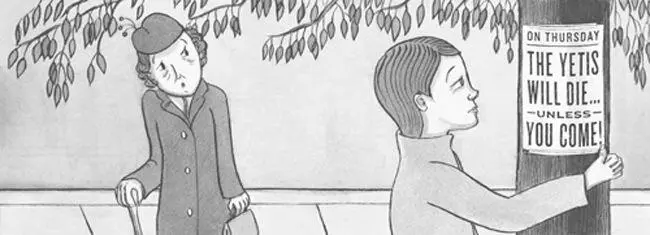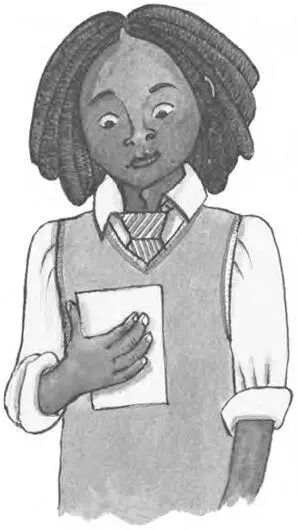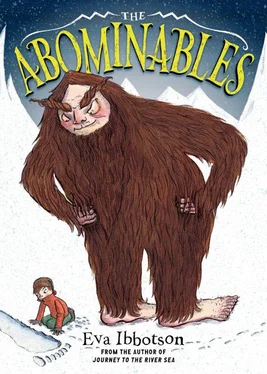“The Queen!” Con felt like hitting his sister because for a moment he’d really hoped. “That’s rich! Two children walking into Buckingham Palace with a crazy story about yetis. Who on earth would take any notice of us?”
“No one,” said Ellen. “Of us. Of two children no one would take any notice. But of two hundred — or two thousand — or twenty thousand,” said Ellen, and her thin face looked as though someone had lit a lamp inside it. “We must have a demonstration, a March for the Yetis. We can demonstrate outside the palace. They’ll have to listen.”
“That won’t be easy,” said Perry, who was stirring three spoonfuls of sugar into each teacup. He knew that when you are tired and depressed, sweet tea is just the thing. “I’ve been to one or two demos in my time, and they take weeks to organize, and you have to have permission from the police or they just come and break it up. And even so, nothing much changes.”
They were quiet for a moment, sipping their scalding tea. Then Ellen said, “What else can we do?”
And, as usual, she was right.
So Perry went out for fish and chips, while Con and Ellen started making posters. Con’s said, ON THURSDAY THE YETIS WILL DIE … UNLESS YOU COME! and then gave the time and place for the demonstration — Buckingham Palace, two o’clock. Ellen’s said, PLEASE, PLEASE, IF YOU CARE ABOUT ANYTHING, CARE ABOUT THIS …
“Right,” said Perry, when they had eaten their fish and chips and wiped the grease off their fingers. “It’s just before five. I’ll go and get these copied. Then you’ll have to get to work.”
“Aren’t you coming with us?” asked Ellen.
“’Fraid not,” said Perry. “I’ve got business of my own to attend to.”
Con said nothing. What could he say? Perry had brought them all the way from the Himalayas; he had helped them in a thousand ways. If he had had enough, then it was only fair — more than fair. But still, it felt like a nail in Con’s heart. Now they really were on their own.
Con and Ellen didn’t get back to Perry’s flat until around midnight. They let themselves in with the key that Perry had given them and sank exhausted onto the bed. They had been all over the place with their carrier bags of posters, sticking them on lampposts and walls, in Underground train stations and bus stops. Sometimes they had been shooed away by irritated shopkeepers and traffic wardens, but sometimes they had met friendly and interested faces. An old lady with a walking stick, making her way slowly along the pavement, had asked Con what it was all about. When he explained, she said that she would tell all her friends. “Not that there are many left,” she said. “And how we’ll get to Buckingham Palace, I don’t know.” Ellen had been stopped by a bearded man who was bundled up in an old blanket in the doorway of a posh office building. Beside him sat a small dog that obviously hadn’t had a bath either. The man had been mumbling quietly to himself, but when he saw Ellen, he shouted suddenly, “That’s it, girl, you tell those—” and he used a word that Ellen hadn’t heard before but was quite sure she shouldn’t use herself.

And tomorrow was the last day. “Do you think anybody will come?” said Con. He was lying on his back in the dark, staring up at the ceiling.
“Con, I don’t know, I just don’t know,” said Ellen. “In the morning we’ll do the schools …” And then sleep took her.
For Con and Ellen, running through the London streets, jumping onto buses, fighting their way through the tunnels of the Underground, the following morning was even more exhausting than the evening before. What they had decided to do was simple enough: call out all the schoolchildren they could find and get them to join the demonstration in front of Buckingham Palace that afternoon and beg the Queen to save the yetis.
They began in Central London, near the river and the docks, and worked their way outward.
Sometimes they separated while Con went to a boys’ school and Ellen, overcoming her shyness, tackled a girls’. Sometimes they came together again before running on to the next district and the next and the next …
The first school Con came to was called Bermeyside Primary, and it was a tough one. There was a fight going on in the asphalt play yard when he arrived, and children were standing round in a circle jeering and cheering. There was no teacher to be seen. But when Con whistled, the fight broke up and the children advanced toward him. A tall boy with dreadlocks spoke.
“Yeah?”
“Listen, I need help,” said Con. “Can you get this school out? The whole school? In front of Buckingham Palace at two o’clock this afternoon?”
“I can,” said the boy, spitting out of the side of his mouth. “But why should I?”
Con explained about the yetis and the boy nodded. “I saw it on the telly. But, man, the Queen . Why not the Mafia or something?”
“The Queen has her own planes. People would listen to her.”
The boy stood looking down at Ambrose’s photograph, which Con had brought.

“Do we get paid?”
“No. Will you come?” said Con.
He spat again. “OK,” he said, holding out his hand. “I’ll get them out, and I’ll get my cousin Mervyn to bring out Fairfield Junior.”
His next school couldn’t have been more different — a little prep school inside the gates of a big house where the boys, in white flannels, were already out on the cricket field. There was the sound of clapping and polite voices saying things like “Well played, Johnson” and “Good for you, Smithers!”
Con climbed over the high wall and dropped down beside a dozy-looking boy in spectacles, who was supposed to be fielding at long off but actually seemed to be searching for interesting-looking beetles.
But though he looked dozy, he was very quick on the uptake. “I saw it on TV,” he said. “And I’ll do everything I can to bring some people. Mind you, there are some pretty grim characters here. There’s a boy called Smithers who pops at nesting blackbirds with his air gun. But I’ll do what I can. Oh, heck, there’s the ball!”
And to groans and catcalls as the nice boy missed his catch, Con ran out of the high gates and continued on …
Ellen, meanwhile, was tackling the girls of the Sacred Heart Convent a couple of streets away. The nuns had already shooed the little girls, in their gray pleated skirts and white blouses, into the school, and Ellen had to barge her way into the locker room where they were changing their outdoor shoes.
Quickly she grabbed two of them, a fat girl with freckles and a thin one with braces, and explained what she wanted. In a minute she was surrounded by whispering, tittering children, some with one shoe on, some with none, all of them wanting to know what was happening. They sighed over Ambrose’s picture, said he was just like a teddy bear, and giggled when Ellen asked them to assemble in front of Buckingham Palace. As she ran to her next school, Ellen felt thoroughly disgusted. She was sure she had wasted her time.
Yet it was those same little girls in their white blouses and kneesocks who, at two o’clock that very afternoon, locked Sister Maria in the lavatory, shut the Mother Superior in the coal house, and marched in an orderly line to Buckingham Palace. What’s more, a girl called Prudence Mallory had found time to make a banner with the words SAVE THE YETIS splashed across it in red ink. The banner was made from the calico bathrobe of Sister Theresa, which another girl, called Betty Bainbridge, had “borrowed” when she was meant to be taking a message to Matron. All in all, Ellen had been very wrong to underrate the girls of the Sacred Heart.
Читать дальше














